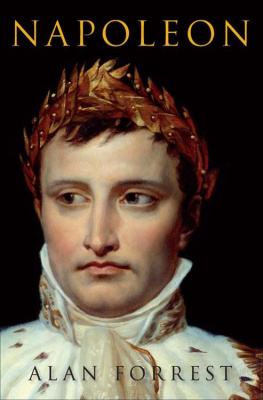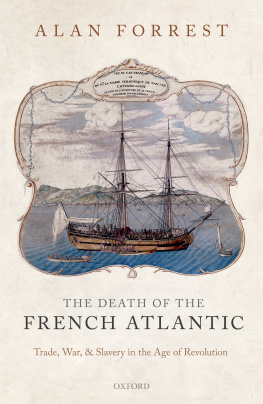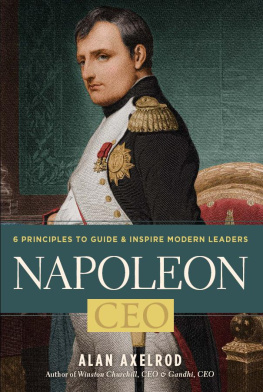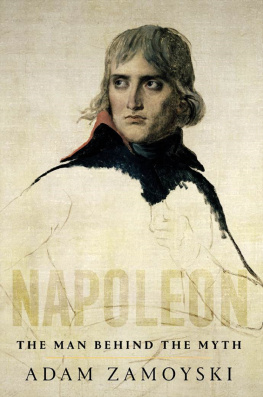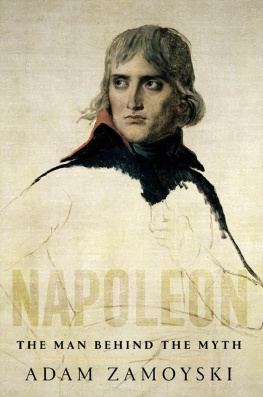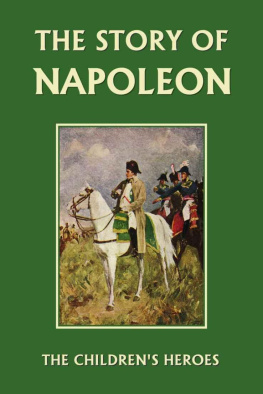Napoleon
Napoleon
Alan Forrest

For Rosemary and Marianne
First published in Great Britain in 2011 by
Quercus
55 Baker Street
7th Floor, South Block
London
WIU 8EW
Copyright 2011 Alan Forrest
The moral right of Alan Forrest to be identified as the author of this work has been asserted in accordance with the Copyright, Designs and Patents Act, 1988.
All rights reserved. No part of this publication may be reproduced or transmitted in any form or by any means, electronic or mechanical, including photocopy, recording, or any information storage and retrieval system, without permission in writing from the publisher.
A CIP catalogue record for this book is available from the British Library
eBook ISBN 978 0 85738 759 2
Print ISBN 978 1 84916 410 8
10 9 8 7 6 5 4 3 2 1
You can find this and many other great books at:
www.quercusbooks.co.uk
Contents
Introduction
Biography can be an inflexible medium, especially for the historian. It shapes a period, a country, a culture around the life of a single individual who may or may not be representative of it. It chooses, almost unavoidably, as its chronological span the dates of that individuals life and birth, telling the story of these years through the prism of his own experience as though, by implication, that experience had an importance that was wider, more all-encompassing, than the life of a single man, that it contributed in some significant way to the history of his times. And, in the case of Napoleon Bonaparte, it can help to give weight to a mythology, adding to the already well-established impression, created by a host of historical and biographical writings across the decades, that what mattered was the man himself, his vision and his ambition, more than the times he lived in or the circumstances he encountered. Few historical characters have had so much written about them, and few have been depicted in such emphatically personal terms, to the extent that the history of a whole era is often presented as the reflection of one mans power and pursuit of glory. Few have mixed history and legend more promiscuously. For that reason it may be wise to pause and begin this book with something approaching a health warning.
There are two ways of writing about Napoleon. One is to present the story of a titanic figure who dictated the history of his age and whose will alone determined the destiny of a continent. In the beginning, as Goethe famously wrote with the rise of German nationalism in mind, was Napoleon. The other is to focus on the Empire, the political and economic system which it created and the cultural dynamic which it encouraged. Goethe probably did not intend the history of these years to be taken over by the personal life of one man, as many historians and biographers have tended to do. And the Empire, stretching across most of the European continent, was certainly not the work of one man. It was a collaborative enterprise that depended on the effort and vision of thousands of administrators, army officers, jurists and educators, a system that may have been conceived by Napoleon as an extension of French power, but which could only work with the active collaboration of others, Germans and Italians, Belgians and Dutch and Poles. The Empire as it had developed by 1806 was multinational, and multilingual, too. If Napoleon dreamed of recreating a Europe on the scale of the Carolingian Empire and looked back for inspiration to Classical Rome, others had to buy into that dream.
These were tumultuous years, dominated in France and beyond by the French Revolution and by the wars it unleashed, events over which the future Emperor had the most tangential influence. This, too, should make us pause and reflect on Napoleons role, on the degree to which he was the product of the more individualistic, meritocratic society which the Revolution created, the product of his times as much as their creator. The history of this period is often presented as the reflection of his ambition, his vision, and his extraordinary imagination. It is a world conceived in the person of the Emperor, held together by his words and actions, as he lived it and as he recorded his reflections in his memoirs, dictated to his companions on Saint Helena. These do give the impression of a coherent and consistent programme, and of an idea of Europe and the Empire which he first forged and then ruthlessly enacted. Yet even interpreting these words and giving credence to his judgments is a delicate exercise; Napoleons reflections on his career and his role in history were written to form opinion, not to reflect it. If there are few actual lies in his account, faithfully copied and published after his death by Emmanuel de Las Cases as the Mmorial de Sainte-Hlne, it is suggestive, often critical of others, and always highly partisan. It must never be forgotten that Napoleon fully appreciated the power of the written word and that he used it to telling effect: his despatches from the army, like his later laws and decrees, were penned with deliberation and an eye to his audience. He surrounded himself with journalists and spin-doctors long before it became a tradition of politics, aware of the importance of public opinion in the new polity he was creating. He wrote to impress his generals and his political allies, and to forge the views of the political elites, both in France and abroad. But he also, from an early age, wrote with future generations in mind, determined to provide justification for his actions and to burnish his image for posterity.
Seeing the history of these years through Napoleons eyes offers a coherence forged by one mans ideas and vision, but this may be deceptive. It may be more useful to think of the Empire less as the personification of Napoleons will and imagination than as a complex political system characterised by a sophisticated legal code and a developed administrative structure, which depended for its success on the cooperation of others and on the convergence of ambitions. Of course Napoleons own ambition played a crucial role here, just as his military prowess and his vision of Empire were critical to the success of the enterprise. But seen in this light, the Empire was much more than one man. It was a military and civil system of government, a triumph of conquest and administration that demanded allies and collaborators, kindred spirits and disciples. It was the response of a generation of lawyers, politicians and generals who had lived through the revolution, who had in many cases administered and directed that revolution, but who had now, in the first years of the nineteenth century, concluded that revolutionary institutions had run their course and that what France needed, above all else, was order and stability.
Napoleons major achievement was to create a civic and legal order that inspired loyalties and, in many parts of Europe, survived after he himself had been banished to Saint Helena and the Empire was no more than a memory. It was less the work of one man, however grandiose his ambitions for empire, than the creation of a generation of Frenchmen brought up on a diet of enlightenment and humanism, and trained to regard good government and justice as essential attributes of a modern state; a generation, moreover, that had come to maturity and had, in many cases, been given undreamt-of opportunities during the decade of the French Revolution. They did not find themselves held back by questions of privilege or prevented by the chance of their birth from taking their place in the service of the state. Nor were they among those whom the Revolution picked out for persecution or excluded from citizenship: those who saw their allegiance to the King as more binding than their loyalty to the republic, who rated their Catholic loyalties above their duties as Frenchmen, who put private profit before public service, or who allowed themselves to be lured by the temptations of counterrevolution or federalism. For some, clearly, the French Revolution had spelt danger and personal catastrophe, and it split entire communities along factional lines. But for the vast majority of Frenchmen, and for some at least among the educated elites of Europe, it brought unrivalled opportunity, expanded the public sphere and offered the possibility of advancement. It was to this generation that the young Napoleon Bonaparte instinctively belonged, a generation ready and eager to grasp the opportunities which meritocracy held out to them. In France and across the Empire jurists and public officials responded to the challenge, accepting posts in the imperial administration, and bringing justice, the Code and efficient bureaucracy to peoples who had never before benefited from them. There is little doubt that for many the advantages of Napoleonic rule far outweighed the burdens of state taxes or the shame of defeat and invasion. They responded to the challenges they were offered and accepted their role in the modernisation of the polity, identifying with the Empire and assuming their part in implementing the Napoleonic dream. The history of these years was a collective enterprise, as much their story as his.
Next page
